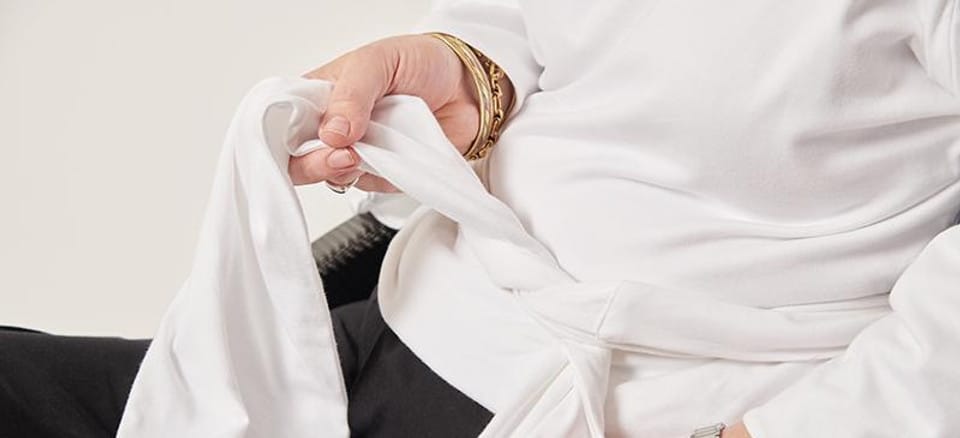The Fashion Industry Still Crucially Needs to Make Adaptive Clothing Mainstream
An interview with Victoria Jenkins, founder of Unhidden Clothing.

“I find it more and more offensive that brands with bigger, and potentially better resources continue to ignore a massive audience that is in desperate need of representation and help.”
Victoria Jenkins founded Unhidden Clothing in 2017, a fashion label that not only creates beautiful adaptive garments for people with disabilities and impairments, but that is also committed to not contributing to pollution or landfill - something the fashion industry is notorious for.
An established garment technologist for a number of suppliers as well as high street and some high end designer brands, Victoria fell seriously ill in 2012, and has spent the last 8 years being diagnosed with a variety of gastrointestinal conditions that put her in the disability community.
We first noticed Victoria and the work of Unhidden Clothing through one of her posts on Instagram, where she was debunking myths about living with disabilities, and wanted to know more about the brand, and how to make it in an industry that is still not catering to disabled people (yet tokenising the disabled community at every chance it gets).
What led you to found Unhidden? Is it more than a business to you?
It was a hospital stay in 2016 that sparked it. I met a woman on my ward who had multiple conditions as a result of chemotherapy, and she was constantly having to undress and expose herself for doctors as well as not being comfortable in the clothing she did have. I thought there had to be a better way, and started researching adaptive fashion right there in my hospital bed. And the more I looked, the more I saw that so few people were being served by what existed then, and that none of it was sustainable. A year later I registered it, and 3.5 years later we launched!

Who are the people behind the brand, and how has Unhidden grown over the years? Has it been well received?
It is mostly myself behind the brand. I have 2 wonderful stakeholders Tam Malley and Dougie Thoms who have supported my vision from the beginning, but the day-to-day of everything so far is almost entirely me. I do have my amazing brand ambassadors and a brilliant intern who helps with some content creation when she can. It’s been a slow progression - trying to fit in creating the range whilst also working freelance for other people, and trying to manage my own health meant that nothing really happened until the lockdown started last year. I decided to use that time to finally take it further and focus more on it. It has been mostly well received. Launching a business during a pandemic was a bold move, and sales are naturally slow as we build trust with our community, but I feel confident we are doing the right thing and providing an option to the largest marginalised group in the world.
How are the Unhidden clothes made, and how does the ‘made to order’ process work?
For now, we are made to order as we haven’t the funds to pay for production runs. It also means we don’t have excess stock, so we are not wasteful, although I do hope to have some stock by the end of the year of ‘popular’ designs. As soon as someone places an order, I contact our fantastic factory in Bulgaria, which makes the garment and sends it to me for packaging and posting to the customer. Brexit has of course had a slight impact on timings, but we have managed OK so far.
Your business is not only socially responsive, it is also eco-conscious, how do you incorporate sustainability to your designs?
Every garment is constructed for longevity. We took no shortcuts on the make, so they should last longer, as every seam and finish has been done to a higher standard. We use deadstock cloth, which is leftover fabric from other companies’ orders, that would otherwise go to landfill - so we are using up waste from the industry. It doesn’t mean there is anything wrong with the fabric, just that either it was rejected for shade issues by a company, or simply too much was made or ordered.
What are your frustrations with the current fashion industry, and the lack of ‘inclusivity’ or tokenisation of disabled people?
I find it more and more offensive that brands with bigger, and potentially better resources continue to ignore a massive audience that is in desperate need of representation and help. There are designers that can make the most incredible couture outfits, walking art, but they can’t find the time to give dignity and comfort to so many who actually need it. Fashion is about style and self-expression - it is also a necessity. We have to wear clothes, and people take it for granted that they can put on underwear, put on clothes, and go about their day. The disabled community doesn’t even have mainstream access to underwear, never mind actual clothing that doesn’t actually hurt them, cause discomfort, or interfere with their bodies or restrict access to their bodies.
Why do you think fashion is being so slow at making adaptive clothing more widespread?
It is a wider problem, but the main reason is that they aren’t hiring people from the community. So no one on the creative teams is seeing the need. More than that, people with disabilities do not have the same access to the courses and education that would allow them to apply for those roles - and I honestly think a person with a visible disability or in a wheelchair would not even get interviewed for a role. All the buildings I have worked in over 12.5 years in the industry did not have access. I am keenly aware I got the roles I did because I do not look disabled, but had I turned up with a walking stick to an interview, I have no doubt I would not have gotten the role despite my ability.
Are there specific elements you wish more fashion brands (and especially fast fashion) considered when designing clothing?
I wish they would turn all their resources to be a force for good change. They have all the industry contacts anyone could ever need to be sustainable, change their supply chain, offset emissions, make less, and by doing so convert their existing customers to sustainable shoppers. I wish they would be truly inclusive - the use of the word ‘inclusive’ by brands that are anything but makes me so, so angry. If you aren’t representing and actually including every marginalised group, then stop using the word inclusive.
On top of the designs, how do you keep everything as accessible and inclusive as possible for customers? Which areas are you looking to improve in the future?
It’s hard as a start-up because I am aware of areas that need to be more accessible - from website function to how we market on social media. I spoke with a UX designer about the website, and they offered a very decent rate of £3k to overhaul it, but I simply haven’t the money. I am beholden to platforms that themselves are not as accessible as they should be (Instagram being the worst offender), so any livestream cannot be captioned and that honestly keeps me awake at night. There are more designs I want to develop that would help even more people, including neurodiverse people, and I would love to bring some more colour and more ‘fashion’ pieces to life. I’ll be launching a Kickstarter in March to hopefully allow all of the above to become a reality!
Are there other projects you are currently working on?
Yes! Along the same theme, I co-founded No Comment Required with Jasmine Leann Gaterell, who is a mental health, ED, and body-positive advocate. No Comment Required is an ethical slogan company covering mental health, disability, the environment, and advocacy. We have a Kickstarter running right now until 28 February 2021, to fund our first production run. Our first slogan, ‘Disability looks good on me’ is at the heart of what we want to do - positive representation and a way of expressing ourselves and our wonderfully diverse differences in a way few places consider. It’s not a giant pity party though - mental health and disability don’t have to be a sombre pity party. There is freedom in embracing them and making them commonplace, rather than ‘othered’.
What do you wish more people knew about living with a disability, and about Unhidden’s work?
I wish they considered that of all marginalised groups, the disabled community is one they could join at any given moment, at any point in their life - so it is in all our interests to advocate for and push for inclusion and accessibility. I simply wish, when it comes to Unhidden, that more people knew we were around, and that there were other brands too that were catering to the community, and fighting hard to make adaptive fashion mainstream. And that it isn’t all doom and gloom!
Discover Unhidden Clothing’s range here. To help support the crowdfunding campaign for No Comment Required (ending until 28 February 2021) please visit Kickstarter.





